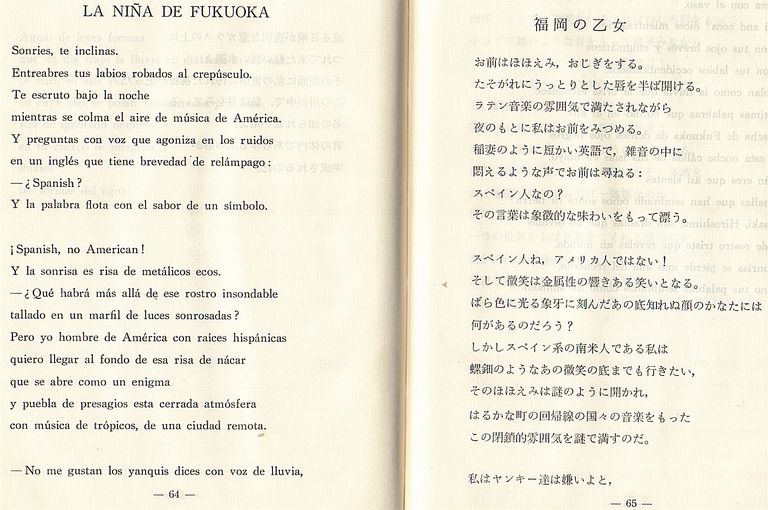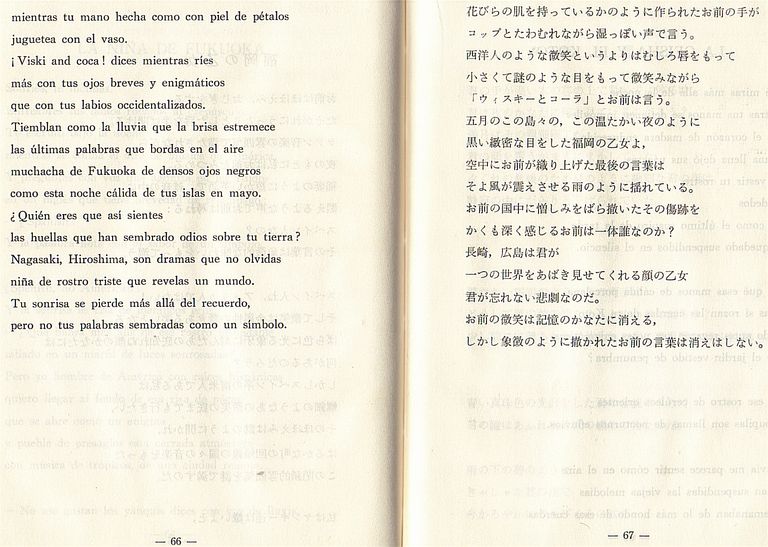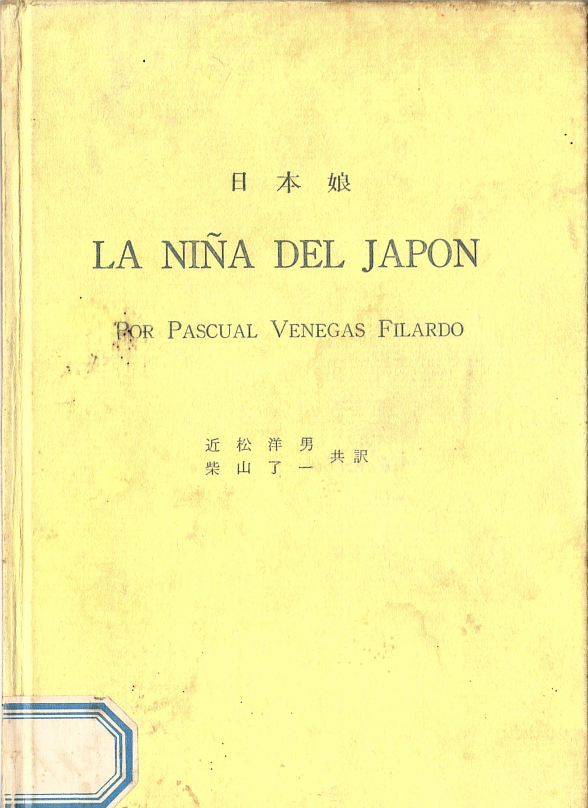I must clarify that the English translation of the poems, originally in Spanish and Japanese, have the terrible weakness that they are simple literal translations, lacking the necessary poetic reworking to adjust the metric, rhyme and cadence that they have in their original languages .
Despite that, the best possible work has been done within my limited capabilities and I hope that publicizing the translation of this work will be of benefit to all.

Fuente
English: |
The Fukuoka GirlYou smile, you bow.You part your lips stolen at twilight. I scrutinize you under the night while the air is filled with the music of America. And questions with a voice that agonizes in the noises in an English that has the shortness of lightning: - Spanish? And the word floats with the flavor of a symbol. Spanish, not American! And the smile is laughter of metallic echoes. - What will there be beyond that unfathomable face carved in an ivory of rosy lights? But I man from America with Hispanic roots I want to get to the bottom of that mother-of-pearl laugh that opens like an enigma and populates with omens this closed atmosphere with music from the tropics, from a remote city. - I do not like the Yankees you say with a voice of rain, while your hand made as with petal skin fiddles with the glass. Viski and coca! you say while laughing but with your brief and enigmatic eyes than with your westernized lips. They tremble like the rain that the breeze shakes the last words you embroider in the air Fukuoka girl with thick black eyes like this warm night on your islands in May. Who are you that you feel like this the footprints that have sown hatred on your land? Nagasaki, Hiroshima, these are dramas you don't forget sad-faced girl who reveals a world. Your smile is lost beyond memory but not your words sown as a symbol. |
Spanish: |
La Niña de FukuokaSonríes, te inclinas.Entreabres tus labios robados al crepúsculo. Te escruto bajo la noche mientras se colma el aire de música de América. Y preguntas con voz que agoniza en los ruidos en un inglés que tiene brevedad de relámpago: — ¿Spanish? Y la palabra flota con el sabor de un símbolo. ¡ Spanish, no American ! Y la sonrisa es risa de metálicos ecos. — ¿ Qué habrá más allá de ese rostro insondable tallado en un marfil de luces sonrosadas ? Pero yo hombre de América con raíces hispánicas quiero llegar al fondo de esa risa de nácar que se abre como un enigma y puebla de presagios esta cerrada atmósfera con música de trópicos, de una ciudad remota. — No me gustan los yanquis dices con voz de lluvia, mientras tu mano hecha como con piel de pétalos juguetea con el vaso. ¡ Viski and coca ! dices mientras ríes mas con tus ojos breves y enigmáticos que con tus labios occidentalizados. Tiemblan como la lluvia que la brisa estremece las ultimas palabras que bordas en el aire muchacha de Fukuoka de densos ojos negros como esta noche cálida de tus islas en mayo. ¿ Quién eres que así sientes las huellas que han sembrado odios sobre tu tierra ? Nagasaki, Hiroshima, son dramas que no olvidas niña de rostro triste que revelas un mundo. Tu sonrisa se pierde más allá del recuerdo, pero no tus palabras sembradas como un símbolo. |
Japanese: |
福岡の乙女お前はほほえみ,おじぎをする。たそがれにうっとりとした唇を半ば開ける。 ラテン音楽の#囲気で満たされながら 夜のもとに私はお前をみつめる。 稲妻のように短かい英語で,雑音の中に 悶えるような声でお前は尋ねる: スペイン人なの? その言葉は象徴的な味わいをもって漂う。 スペイン人ね,アメリカ人ではない! そして微笑は金厲性の题きある笑いとなる。 ばら色に光る象牙に刻んだあの底知れぬ顔のかなたには 何があるのだろう? しかしスペイン系の南米人である私は 螺鈿のようなあの微笑の底までも行きたい, そのほほえみは謎のように開かれ, はるかな町の回帰線の国々の音楽をもった この閉鎖的#囲気を謎で満すのだ。 私はヤンキ一逹は嫌いよと, 花びらの肌を持っているかのように作られたお前の手が コップとたわむれながら湿っぽい声で言う。 西洋人のような微笑というよりはむしろ唇をもって 小さくて謎のような目をもって微笑みながら 「ウ < スキ一とコーラ」とお前は言う。 五月のこの島々の,この温たかい夜のように 黒い緻密な目をした福岡の乙女よ, 空中にお前が織り上げた最後の言葉は そよ風が震えさせる雨のように揺れている。 お前の国中に憎しみをばら撤いたその傲跡を かくも深く感じるお前は一体誰なのか? 長崎,広島は君が —つの世界をあばき見せてくれる顔の乙女 君が忘れない悲劇なのだ。 お前の微笑は記憶のかなたに消える, しかし象徴のように撤かれたお前の言葉は消えはしない。 |
Due to very different circumstances, I found myself with a book that I had saved, it is a somewhat peculiar poetry book in my library, since it is the bilingual edition in Spanish and Japanese of the Venezuelan poet Pascual Venegas Filardo. The work was published for the first time in 1961, but this one I have here is the 1968 edition, published in Kyoto by Gaikokugo Daigaku and consists of 76 pages, bound in hardcover.
The foreword to this book of poems was written by the Venezuelan Ambassador to Japan, J. M. Pérez Morales. In fact, what is most curious to me is that the book I have was from the embassy library ... don't go after me with the excommunication order for stealing books, I really didn't! I think the book was disincorporated or something similar, and then it passed through several hands until it came to me.
I have, to some extent, some affinity with some traits of Eastern cultures, there are several things that I like and in recent times I dusted off a few of them. I thought about checking if the book was available to share, but I only found fragments online, hence the idea of digitizing it and applying OCR to it to share it as it is in print, in both languages. Later on a suggestion from a reader, I decided to translate it into English, even if it is just to give an idea of what the beautiful poems in this book want to express.
Sources:




Mucho más que un navegador. Disfruta de una navegación privada, segura y rápida con Brave